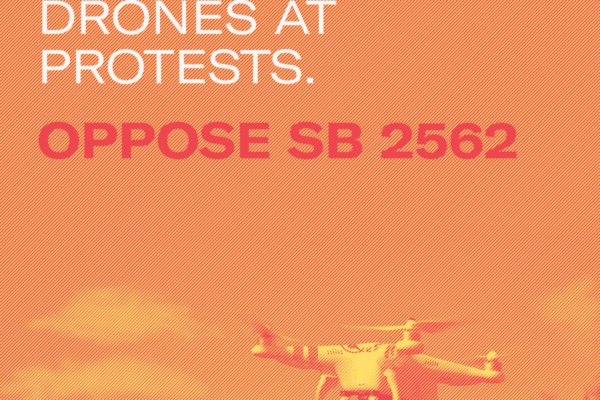A measure that allows police to deploy drones with powerful surveillance technology has moved to the Illinois House. The bill, Senate Bill 2562, is being pushed by the Chicago Police Department and would effectively gut ground-breaking legislation passed and signed into law just three years ago requiring a judicial warrant for the use of drones by police in Illinois.
In Committee testimony last week, a representative for the CPD made clear that the police would use the technology whenever a group of more than 100 persons gather in the City. Given the sheer number of community and neighborhood events, family reunions in public parks, protests and parades that take place in the City every day, the testimony raised the real prospect of near constant drone surveillance in Chicago.
“The magnitude of this type of surveillance is alarming,” said Karen Sheley, Director of the ACLU Police Practices Project. “Imagine being in Lincoln Park for a family picnic or at a neighborhood festival and looking up to see a drone – a police drone that could be capturing a photograph of your face. This is frightening.”
Senate Bill 2562 was approved by the Senate earlier in the session and is not on the floor of the House. The bill allows drones to be used to make video, audio and still recordings of crowds, and worse, to be equipped with facial recognition technology. When the bill was heard in a House Committee last week, the CPD representative was questioned about whether drones would be used in a racially-discriminatory fashion. The representative responded by suggesting that whenever a crowd of more than 100 gathered – anywhere in the City – the police would be there with drones.
“If this bill is passed, as drafted, drones could identify and list people engaging in First Amendment activity or simply gathering with friends and family,” added Sheley. “The sight of drones overhead, collecting information, may deter people from attending these events.”
“This is dangerous in a free society.”
The ACLU argued previously against this bill and continues to speak with legislators about the real problems presented by the City’s grab for this broad, sweeping power.
Stay Informed
Sign up to be the first to hear about how to take action.
By completing this form, I agree to receive occasional emails per the terms of the ACLU’s privacy statement.
By completing this form, I agree to receive occasional emails per the terms of the ACLU’s privacy statement.

